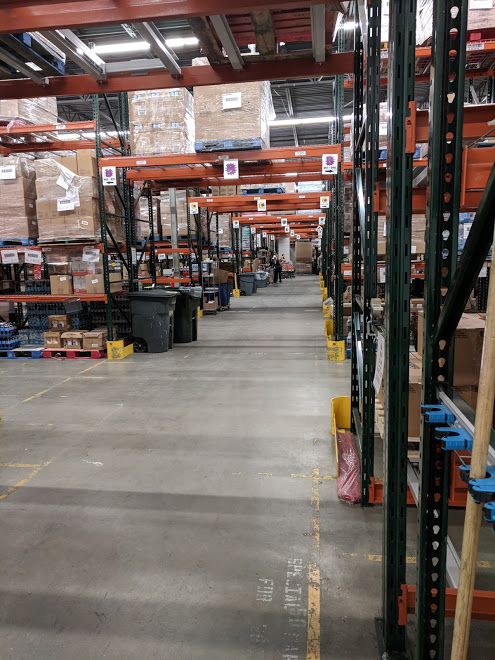An executive networking group I’m in did some volunteer work at Food Bank of the Rockies this morning, helping pull donated goods (all corporate donations in our case) onto pallets, shrink wrap them, then identify what shipment they were for (mostly to food banks or religious groups that organize food distribution for poor in their communities).
In the course of the morning, the trio I was in loaded up six pallets six feet high full of light things (13 cases of Sriracha Cheez-Its! 30 boxes of Sweet Potato Flake Cereal) and not-so-light things (71 12-packs of Coconut Water! 12 20# bags of onions!), all for one particular organization. It was very tiring work, but interesting to see how it all worked.
FBR provides food relief for 30 Colorado counties and all of Wyoming, delivering close to 49 million meals a year. Volunteering helped me feel a part of that, which is a neat thing to do around the holiday season, but I suspect they can use help all year around. And I suspect there are other organizations of this sort in communities around the nation that could use help in these times.
(Also, they have a huge wall in the warehouse covered with giant checks — company X gives a $20K donation to the FBR, and there’s a photo op with the giant check, and they actually keep them here (after deposit, one presumes), mounted on the wall. It was kind of fascinating to see; not sure why I didn’t take a picture.)


I'm acquainted (via Facebook) with a couple of people that do warehouse work for a living (the Inland Empire in California has a ton of warehouses). Tough work.
+John E. Bredehoft It was plenty of fun … for a single morning, with others willing to trade off on the twisting and lifting work. Not what I'm looking for as a career.
(Yes, flying into ONT is like going over miles and miles of massive, skylight-dotted warehouse space.)
And on the profit (not the not-for-profit) level, it's an interesting indicator of how our economy is evolving. I sit at home and click on a link to order something, Amazon sends the order to a warehouse – which may not even be an Amazon warehouse – and a contract worker (perhaps not even an employee) stuffs it in a box while being timed. It's probably better to be stuffing boxes in Ontario California than it is to be making phones in China, but it's still hard work.
+John E. Bredehoft And, as came up in discussion the other day, more and more of this is being automated. If things are done properly, robots can pick from shelves as quickly, easily, and accurately as humans. Probably more so.